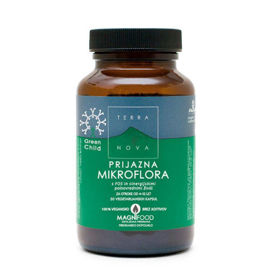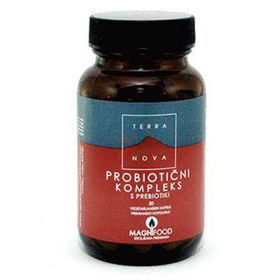
Did you know that intestinal diseases have become more common in recent years? And that colon cancer is already the leading cause of death in the US, second in Europe? But bowel problems can also manifest in other organs, as there are points in the colon that are connected to other organs by the nervous system. This is also why this body deserves special attention.
The colon should be emptied at least once a day. This is the septic tank of our body, where, in addition to the remnants of digestion, toxic substances are collected every day from the whole body, which the liver excretes through the bile duct into the duodenum and through the small intestine into the colon. Billions of dead cells from all over the body are collected there. If we have a healthy colon, the food we eat needs less than 24 hours to pass through the body. With modern eating habits (processed food that has too few enzymes, fiber and nutrients or none at all), the passage of food is slowed down to up to 70 hours. During this time, however, several kilograms of waste can also accumulate in the colon. If these dead cells and toxic substances remain in the body for more than 24 hours, self-poisoning occurs. A clogged gut negatively affects all vital functions as all the organs and systems in the body are connected. If one of the bodies is threatened, the other will take over its role. But oversaturation with toxins, poor digestion, and a weakened immune system allow infectious germs to penetrate the brain, heart, joints, muscles, and other organs.
Constipation is mostly caused by poor nutrition. White flour and all products made from it glue the intestines. The waste, which should come from the intestine, therefore gets stuck, and when new and new waste arrives, it presses on the walls of the large intestine, which under pressure stretches and stretches up to 30 cm in diameter, on the other hand there is a narrowing so that the stool barely passes through such straits. Excessive consumption of meat, especially heavily grilled and smoked meat, also leads to the most serious diseases of the present time. The human intestine is about 10 meters long (carnivorous animals are shorter, up to about two meters long), so the meat or waste from it stays in it for a longer time and causes rot. The solution is to eat as much fresh fruit, vegetables, greens in the form of pulpy juices and nuts, organically grown, ie without the use of fertilizers, pesticides, fungicides, herbicides and non-genetically modified.
This also explains why some people eat very little and have a feeling of having a lazy digestion, and even think they are gaining weight just by looking at food. They do not know, however, that they can speed up their metabolism quite naturally with more appropriate combinations of foods, taking into account the natural laws of the body given to us by evolution. They do not have a slow digestion by nature, but inhibit it and thus endanger their health.
As long as we are young, the body manages to digest all the unhealthy food and the wrong combinations of foods, and with years of digesting unhealthy food, the gut "gets tired" and the excretory organs are unable to excrete all the waste products. The first signs of the disease appear - usually where we are most sensitive or. we have a better predisposition to developing the disease.
SMALL INTESTINE
The small intestine is the heart of the digestive tract. It measures about six meters in length, and in it the food consumed is converted into a nutrient that nourishes our body and imbues it with energy. Control systems such as probiotic and lymphocyte strains, immunoglobulin A (IgA), Peyer’s patches, and M cells are found in the intestinal mucosa. This mucosa is the seat of our immunity, so it is worth nurturing and properly strengthening. The intestinal mucosa, which is very thin (2.5 mm), acts as a barrier between the waste products of ingested food, among which we can also find pathogenic bacteria (in the feces), and the inside of our body (blood). This barrier must be very effective in absorption and very safe in defense against toxins, so it must be healthy. If it does not work well and allows a large number of molecules, even harmful ones, to pass through it, many diseases can break out. One of the most common is irritable bowel syndrome.
COLON
The large intestine is about a meter and a half long and reaches to the buttocks. In addition to the secretion of mucus, the main function of the colon is the absorption of water and salt. Two processes take place in the large intestine: putrefaction and fermentation. In putrefaction, protein molecules are converted into simple and digestible ones, and in fermentation, intestinal microorganisms break down the bonds of various carbohydrates to produce energy.
Symptoms of a lazy or too slow colon
Digestive symptoms: constipation, bloating, diarrhea, flatulence, indigestion, abdominal pain. General health: joint pain, muscle pain. Behavioral symptoms: depression, fatigue, anxiety, mood swings, memory impairment. Immune system: poor immunity, recurrent vaginal and urinary tract infections, skin rashes.
From the Terra Nova treasury
Probiotics
Did you know that there are about 100,000 billion bacteria living in the digestive tract that belong to more than 400 different species? That there are ten times more bacterial cells in us than all human cells together, and their concentration is highest in the gut? The role of microorganisms in the digestive tract has not yet been fully elucidated, although it is known to perform at least two functions: it metabolizes host food and protects against infections.
Changes in the balance between bacterial communities are associated with health problems and diseases. To regulate the intestinal flora and improve digestion and resistance, it is recommended to add beneficial microorganisms - probiotics together with prebiotics and fiber, which are needed for the functioning and reproduction of healthy microorganisms.
The change in the microbiome is influenced by stomach acid, bile salts, diet, stress, aging and even climate change. If you have digestive problems, too high cholesterol, reduced resistance ..., probiotics are a great help.
At Terranova you have a choice of Probiotic complex with prebiotics for adults and Friendly microflora for children - children's probiotics. Depleted intestinal microflora is a risk factor for digestive problems and impaired immunity of children, and also affects well-being. The healthy intestinal flora of children is most endangered by a modern diet rich in simple carbohydrates and antibiotics that indiscriminately destroy all bacteria - harmful and beneficial.











